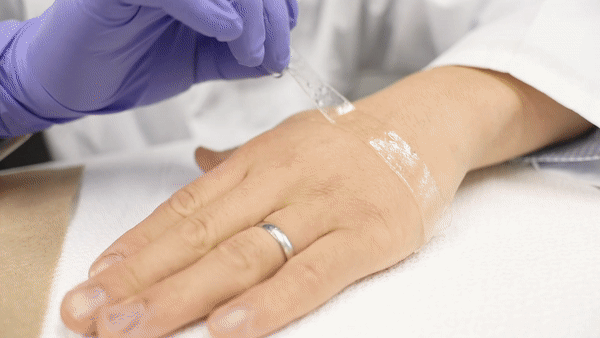The sensor is named artificial ionic skin, or AISkin, and the scientists hope the novel properties of AISkin could pave the way for further advancements in wearable electronics, robotics, and personal health care.
The adhesive AISkin is developed using two oppositely charged sheets of stretchable substances known as hydrogels. The researchers overlay positive and negative ions to form a “sensing junction” on the surface of the gel.
Upon being subjected to humidity, strain, or temperature changes, the AISkin produces controlled ion movements over the sensing junction, which can be quantified as electrical signals such as current and voltage.
If you look at human skin, how we sense heat or pressure, our neural cells transmit information through ions—it’s really not so different from our artificial skin.
Xinyu Liu, Professor, Department of Mechanical and Industrial Engineering, University of Toronto Engineering
Moreover, AISkin is extremely tough and stretchy. “Our human skin can stretch about 50 per cent, but our AISkin can stretch up to 400 per cent of its length without breaking,” stated Binbin Ying (MIE), a visiting PhD candidate from McGill University who leads the study in Liu’s lab. Recently, the study outcomes were reported in Materials Horizons.
Liu added that the new AISkin could pave the way for skin-like Fitbits that quantify several body parameters, or an adhesive touchpad that can be attached to the surface of the hand. “It could work for athletes looking to measure the rigour of their training, or it could be a wearable touchpad to play games.”
In addition, it could quantify muscle rehabilitation progress.
If you were to put this material on a glove of a patient rehabilitating their hand for example, the health care workers would be able to monitor their finger-bending movements.
Xinyu Liu, Professor, Department of Mechanical and Industrial Engineering, University of Toronto Engineering
The AISkin could also find applications in soft robotics, which are flexible bots developed completely using polymers. One such example is soft robotic grippers, employed in factories, to hold delicate objects including food and light bulbs.
The scientists believe AISkin could soon be incorporated into soft robots in order to quantify data such as the pressure required to hold brittle objects or the temperature of food.
In the coming year, the focus of Liu’s lab will be on further improving their AISkin, with the aim to reduce the size of AISkin sensors using a microfabrication technique. In addition, bio-sensing capabilities will be added to the material, enabling it to measure biomolecules in body fluids like sweat.
If we further advance this research, this could be something we put on like a ‘smart bandage’. Wound healing requires breathability, moisture balance—ionic skin feels like the natural next step.
Xinyu Liu, Professor, Department of Mechanical and Industrial Engineering, University of Toronto Engineering

Human skin can stretch about 50%, but our AISkin can stretch up to 400% of its length without breaking. Video Credit: Daria Perevezentsev.